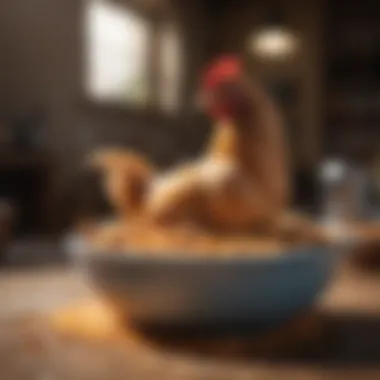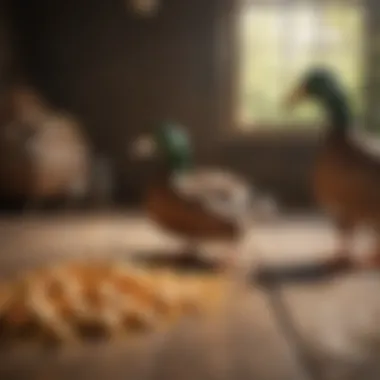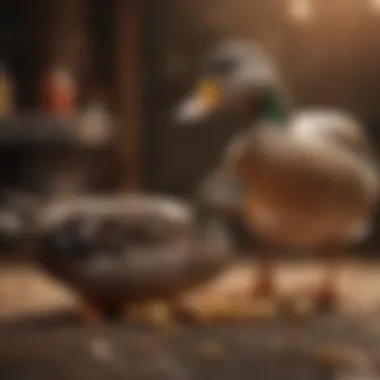Can Ducks Safely Consume Chicken Feed? Insights & Tips


Intro
Ducks, like any other animal, have specific dietary requirements. Their nutritional needs differ from those of chickens. Not all feeds are created equal; it is crucial to understand the nutritional composition of chicken feed before incorporating it into a duck’s diet. This article will guide pet owners and poultry enthusiasts through the intricacies of what is best for their feathered companions.
In the upcoming sections, we will review the nutritional values of chicken feed, address potential health concerns, and explore alternative dietary options that can sustain your ducks in a healthier way. This comprehensive examination is aimed at ensuring you make informed decisions about your ducks' feeding practices.
Nutrition and Diet Tips
Maintaining a balanced diet for ducks is fundamental. Ducks require a range of nutrients to thrive, including proteins, carbohydrates, fats, vitamins, and minerals. Chicken feed, which is often higher in protein than what ducks need, may not fulfill their specific requirements. Ducks may benefit from a feed high in fiber, which is not typically found in chicken feed. This section examines how you can ensure your ducks are getting the right nutrition.
Key Nutrients for Ducks
- Proteins: Important for growth and development.
- Carbohydrates: Provide energy for daily activities.
- Fats: Necessary for skin and feather health.
- Vitamins and minerals: Essential for overall health, including calcium for eggs.
Ducks generally thrive on a diet formulated specifically for them. A balanced feed that contains about 16-18% proteins is recommended for ducks. Moreover, they must have access to fresh vegetables, grains, and clean water.
Health Implications
Although feeding ducks chicken feed may not cause immediate harm, there are several potential health concerns to consider. One primary concern is that chicken feed can lead to obesity in ducks due to its high protein content. Excessive protein can reduce the overall energy levels of ducks, leading to a sedentary lifestyle that fosters further health issues.
Common Health Issues
- Obesity: Caused by a diet excessively rich in proteins.
- Feathers quality: Poor nutrition can result in unhealthy feathers.
- Laying Issues: Improper calcium intake can lead to eggshell weakness in laying ducks.
Solutions
To mitigate these risks, it's advisable to focus on providing a balanced diet. Regularly monitoring their body weight and adjusting their feed is crucial. Also, consult a veterinarian to tailor the diet based on specific health needs.
Alternative Dietary Options
If you're concerned about using chicken feed, there are many alternatives available. Ducks can eat formulated duck feed, which is designed to meet their unique dietary needs. Additionally, providing a varied diet can enhance their health.
Some options to consider include:
- Pelleted Duck Feed: Specifically designed for ducks with appropriate nutritional levels.
- Grains: Such as corn and oats can supplement their diet.
- Kitchen Scraps: Certain fruits and vegetables can be added to their diet, avoiding anything toxic.
Finale
In summary, while ducks can eat chicken feed, it's not always the best option for their health. Providing a diet rich in nutrients catered to ducks ensures that they live a healthy life. Understanding their specific dietary requirements and potential health implications is essential for any duck owner. Paying attention to proper nutrition and feeding practices will ultimately support the overall well-being of your ducks.
Preface
Understanding the dietary needs of ducks is essential for both their health and well-being. With an increasing number of pet owners considering ducks as part of their family, it becomes crucial to address questions around their feeding habits. One common inquiry is whether ducks can safely consume chicken feed. This article investigates not only the compatibility of chicken feed with duck diets but also the nutritional implications this feeding practice may entail.


The dietary preferences of ducks can be quite diverse. These birds have evolved to eat a mixture of grains, greens, and small invertebrates found in their natural environments. Their nutritional requirements differ significantly from those of chickens, which can have consequences if the wrong feed is provided. Therefore, understanding these differences is crucial for any duck owner.
Another important aspect of this discussion involves chicken feed itself. Many potential duck owners might assume that chicken feed could suffice as a substitute, given the accessibility and availability of such products. However, the actual nutritional content and intended purpose of chicken feed must be closely examined to determine its efficacy for feeding ducks.
This article aims to create awareness regarding the feeding habits of ducks, detailing the nutritional analysis of chicken feed, its potential risks, and the best practices for ensuring ducks remain healthy. Through this exploration, we can provide a well-rounded perspective that will benefit both seasoned and novice duck owners alike.
The Feeding Habits of Ducks
Ducks, being omnivorous animals, have a varied palette when it comes to their diet. Their natural feeding habits include foraging for aquatic plants, insects, and small fish. This natural behavior is bounded by their environment, which plays a key role in the nutrients they obtain. In captivity, however, it becomes the owner's responsibility to provide a balanced diet that mirrors this variety.
Ducks tend to exhibit some selective eating behavior. They often prefer fresh greens over dried feed. They forage actively, spending hours each day searching for food, which is beneficial for their overall health. Ducks also benefit from a diet rich in fiber, as it aids digestion and ensures their gizzard stays healthy.
To promote optimal health, it is recommended to include a variety of foods in their diets. This can encompass grains, vegetables, and commercial duck feed that is formulated to meet their unique nutritional needs. Understanding what ducks eat naturally can provide insight into creating a balanced diet that is not solely reliant on one type of feed.
Understanding Chicken Feed
Chicken feed is specifically formulated to meet the dietary needs of chickens, focusing on their growth, egg production, and overall health. Typically, it contains a combination of grains, protein sources, vitamins, and minerals designed for maximum efficiency. However, this tailored formulation might not be suitable for ducks.
The basic ingredients in chicken feed can include corn, soybean meal, wheat, and a variety of supplements. While these components provide essential nutrients like protein and carbohydrates, they may not adequately cater to the specific needs of ducks, who benefit from additional fiber and different protein sources.
It is crucial for duck owners to be aware that not all chicken feeds are created equal. Some feeds may contain additives or antibiotic residues that might not sit well with ducks, posing potential health risks.
Furthermore, the protein content in chicken feed is often higher than what ducks require. High protein levels are standard in chicken diets, particularly for layers, yet ducks need lower protein percentages to avoid health issues, including kidney strain. Being informed about the nutritional make-up of chicken feed helps in making better feeding choices for ducks, ensuring their long-term health and vitality.
Nutritional Analysis
The topic of nutritional analysis is crucial when understanding what to feed ducks and the suitability of chicken feed as part of their diet. This analysis helps to identify the nutritional requirements of ducks and whether chicken feed can meet those needs. Carefully examining the components of chicken feed and comparing them against the dietary needs of ducks provides valuable insights. This ensures that their health is not compromised and they receive adequate nutrition.
Key Ingredients in Chicken Feed
Chicken feed typically consists of several core ingredients, each serving a distinct purpose in nutrition. The most common elements are:
- Corn: Primarily a source of energy, corn is a staple in many feed formulations. It provides carbohydrates but lacks certain essential nutrients.
- Soybean Meal: This ingredient is high in protein and is crucial for muscle development. Ducks require adequate protein for growth as well.
- Wheat: Often included for its fiber content, wheat helps with digestion and can ease intestinal health.
- Vitamins and Minerals: Various vitamins (such as A, D, and E) and minerals (like calcium and phosphorus) are added to ensure that the feed supports overall health.
Each of these ingredients contributes to the overall nutrition profile, but their proportions may vary across different brands. Therefore, it is critical to read the labels and understand what is present in the feed before deciding to offer it to ducks.
Nutrients Critical for Ducks
Ducks have specific nutritional requirements that must be met for optimal health. Some key nutrients that are particularly important include:
- Protein: Necessary for growth, egg production, and overall body function. Ducks might require higher protein levels during particular life stages, such as when they are growing or laying eggs.
- Fatty Acids: Essential for energy and maintaining healthy feathers. Ducks require a balanced intake of fatty acids to keep their skin healthy and improve their immune function.
- Fiber: Important for digestive health, fiber ensures that ducks can properly process their food. It is vital for preventing digestive issues that can arise from consuming high-energy feeds that lack bulk.
- Calcium: Particularly important for laying hens, calcium is necessary for eggshell formation. Ducks that do not receive enough calcium may lay eggs with thin shells.
The interplay of these nutrients impacts not only their growth and development but also their reproductive success and immune health. Careful consideration of nutrition can ensure ducks thrive while consuming chicken feed or any alternative diet.
Compatibility of Chicken Feed for Ducks


When considering the diet of ducks, the question of whether chicken feed is appropriate arises frequently. Understanding the compatibility of chicken feed with duck diets is crucial for pet owners and enthusiasts. Ducks and chickens share some nutritional requirements, but their digestive systems differ. This section explores specific elements that make chicken feed a possible additive to a duck's diet, while also examining the potential health implications.
Potential Benefits
There are several potential benefits to feeding ducks chicken feed. The primary advantage lies in the overlapping nutrient profiles between here two species. Chicken feed is generally formulated to provide adequate protein, vitamins, and minerals necessary for poultry health. Ducks can benefit from these nutrients, especially when they are young and developing.
Especially important in chicken feed is the protein content, which supports muscle growth and feather development in ducks. Additionally, some commercial chicken feeds contain essential vitamins like B12 and riboflavin, which help in metabolic functions and promote overall health.
Overall, when introduced in moderation, chicken feed can serve as a supplementary food option, providing ducks with quick access to essential nutrients. However, this should be done carefully to maintain a balanced diet.
Possible Risks
While there are benefits, there are also considerable risks involved in feeding ducks exclusively or predominantly chicken feed. One major concern is the calcium content typically found in chicken feed. Ducks have different calcium requirements compared to chickens, especially layers. Excessive calcium can lead to kidney problems in ducks, affecting their long-term health.
Furthermore, chicken feed often contains medication additives aimed at preventing diseases in chickens. Ducks may be more sensitive to these medications, which can cause adverse reactions. It is crucial to read labels carefully and ensure that the ingredients are appropriate for ducks.
Additionally, ducks have a higher tendency to develop obesity if they consume too many calorie-dense grains found in many chicken feeds. This can lead to poor health outcomes including reproductive issues and diminished mobility.
Digestive Health Considerations
Digestive health is a vital consideration when it comes to incorporating chicken feed into a duck's diet. Ducks are natural foragers with a unique digestive physiology designed to break down a variety of plant materials. This means that relying solely on chicken feed can disrupt their normal digestive processes.
In general, ducks require a diverse diet that includes grains, vegetables, and proteins. Introducing chicken feed too suddenly or in large quantities can cause digestive upset leading to diarrhea or more severe health problems. It is advisable to mix chicken feed with their traditional diet gradually, ensuring that ducks can adapt without harm.
It is critical to monitor the duck’s health and behavior closely when modifying their diet to prevent any health complications.
Feeding Practices
Feeding practices are central to understanding how to support the health and well-being of ducks. The dietary habits of ducks can significantly influence their growth, reproduction, and overall vitality. This section outlines essential elements regarding feeding practices, especially the integration of chicken feed into a duck's diet. It will address the importance of proper ratios and potential supplements to ensure ducks receive a balanced nutrition.
Recommended Feeding Ratios
To optimize the health of ducks consuming chicken feed, establishing appropriate feeding ratios is critical. Ducks have unique dietary needs that differ from chickens. While chicken feed can be utilized, the amounts must be carefully monitored to prevent nutritional deficiencies or excesses.
A general formula that can be beneficial is:
- 70% grains: This includes corn, wheat, or pellets that are suitable for ducks.
- 30% chicken feed: This provides the essential vitamins and minerals that chicken feed often contains, but it should not make up the entirety of their diet.
Regular monitoring of your ducks will help adjust these ratios according to their specific needs, especially with changing weather or life stages.
Supplementing Chicken Feed
While chicken feed can serve as a supplementary diet for ducks, it is essential to incorporate additional nutrients to ensure holistic health. Supplements can enhance the nutritional value of a duck's diet, addressing any potential deficiencies in chicken feed.


Consider adding:
- Leafy greens: Vegetables like kale or lettuce can provide important vitamins.
- Grains: Cracked corn or wheat can be mixed in for energy.
- Proteins: Mealworms or suitable protein sources can offer essential amino acids.
- Fruits: Items like berries or melon can introduce vitamins along with hydration.
Feeding absolute supplements can also promote digestive health and help ducks absorb nutrients more effectively. Careful planning and awareness of ingredients will make for a balanced feeding strategy.
A good feeding practice relies on attention to detail, allowing for a harmonious balance between chicken feed and supplemental foods.
Alternatives to Chicken Feed
Understanding alternatives to chicken feed is essential for duck owners who want to ensure the well-being of their birds. Ducks have unique dietary needs that differ from those of chickens. Choosing the right feed can significantly impact their health and productivity. Several alternatives exist, including commercial duck feed and natural options, each with distinct characteristics and benefits.
Commercial Duck Feed
Commercial duck feed is specially formulated to meet the nutritional needs of ducks. This type of feed often contains a balanced mixture of essential ingredients, including proteins, carbohydrates, and fats. It is designed to promote healthy growth and production in ducks, whether for laying eggs or meat purposes. One key characteristic of commercial duck feed is its higher protein content compared to chicken feed, which is crucial for developing strong muscles and overall health in ducks.
Additionally, commercial feeds often include vitamins and minerals that support the immune system and enhance reproductive performance. These tailored formulations help avoid nutritional deficiencies that can arise from feeding ducks chicken feed. However, it is important to select a quality brand that resonates with the specific needs of your ducks, as not all commercial feeds are created equally.
Natural Feeding Options
Natural feeding options offer a diverse and beneficial supplement to ducks' diets, providing not only nutrition but also mental stimulation. Ducks can thrive on a variety of natural foods, which can be divided into the following categories:
Vegetables
Vegetables are a great source of vitamins and minerals for ducks. Common choices include leafy greens, carrots, and peas. The crisp texture of these foods can encourage ducks to forage, simulating their natural behavior. This is crucial for their physical activity. One notable advantage of feeding ducks vegetables is the hydration aspect; many vegetables have high water content, which aids in digestion. There is a benefit in variety as well; introducing different veggies can prevent boredom in their diet.
Grains
Grains are another significant aspect of a duck's diet. Options such as corn, oats, and barley provide vital carbohydrates, contributing to energy levels required for daily activity. One of the notable characteristics of grains is their ability to be easily stored and fed. They are often less expensive than other food types. However, moderation is key, as too much grain can lead to obesity and related health issues.
Fruits
Fruits can also be a beneficial part of a duck's diet. Options like berries, melons, and apples offer natural sugars and vital nutrients. The appealing sweetness of fruits usually attracts ducks, encouraging them to partake in these healthy snacks. One unique feature of fruits is their antioxidant properties, which can enhance overall health. While fruits should be given in moderation due to their sugar content, they can serve as a delightful treat that enriches the daily intake for ducks, juxtaposing their regular feed with something refreshing.
Ensuring a balanced approach to feed can help duck owners maintain optimal health for their birds while allowing them to enjoy a variety of tastes and textures in their diets.
The key takeaway is that while chicken feed may be convenient, exploring alternatives like commercial duck feed and natural food options can provide ducks with a healthier and more enjoyable diet.
Epilogue
Summarizing Key Points
- Ducks and chicken feed have several compatibility aspects, but it’s essential to consider their specific dietary requirements.
- The nutritional elements in chicken feed can offer some benefits such as protein and energy. However, they might not suffice as a complete diet for ducks.
- Ducks must have a well-balanced diet that includes diverse nutrients, which can be an issue when solely relying on chicken feed.
- Digestive health of ducks can be impacted by improper feeding practices, making awareness crucial for duck owners.
- Alternatives like commercial duck feed and natural options can enrich their diet.
Final Recommendations for Duck Owners
For duck owners, the following recommendations emerge:
- Assess Nutritional Needs: Always evaluate your ducks’ age, size, and specific dietary requirements.
- Balanced Feed: It’s advisable to provide a balanced diet rather than relying entirely on chicken feed.
- Incorporate Variety: Include grains, vegetables, and fruits in their meals, enhancing nutrient intake.
- Monitor Health: Regularly check for any health issues. Watch for signs of digestive distress, which can indicate dietary problems.
- Consult Experts: When in doubt, seek advice from veterinarians or animal nutritionists. They can guide you on the best feeding practices for your ducks.
By integrating diverse dietary options and ensuring a balanced approach, duck owners can successfully nurture healthy and happy ducks.







